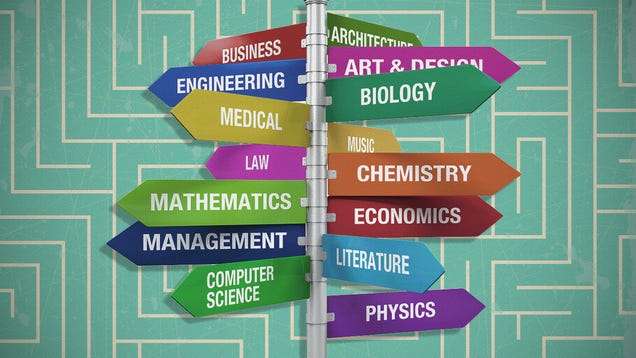Is Your Major Adaptable
Choosing an adaptable major helps accommodate the potential for future career changes. For example, a major in communications can lead to careers in publishing, journalism, marketing, public relations, and sales, whereas a literature degree might offer a more limited pathway.
Students can also improve their major’s adaptability through concentrations, research projects, electives, and internships. Diversifying your resume while in college can open a lot of career doors after graduation.
How I Choose My Major
Along with that thought process, I was also looking at what this country needs right now in terms of educated people. At the time and still today, many issues have to do with politics or that politics could solve. So, while looking at this major, I thought about how I could best help, and that was by bringing more diversity and a younger mindset to the issues. Even if I dont become a lawyer, I would still enjoy working in another career but in the same field.
I think it is important to recognize that when choosing a major. Even if you dont end up working in the position you planned, you should be okay with working in another position but in the same field. For example, I would still be happy in the field even if I dont get to be exactly what I want, just as long as I feel I am positively impacting this country and my field.
What Do You Want To Do With Your College Major And Degree
- Consider majors related to the field you want to go into
The most obvious thing to consider is what youd like to do after college. If theres a specialized field you want to pursue, or even a specific careerlike social work or engineeringit makes the decision a lot simpler.
As a high school student you dont necessarily need to know exactly what you want to major in., but having a career in mind can guide your search.
Not sure what career youre interested in? No problem you can still narrow down your search for the right college major. ACT offers a free career and major search that matches you to fields based on your personality.
Keep in mind that some professionslike medicine and lawdont have specific majors . Instead, interested students follow a pre-professional track which fulfills certain core requirements.
Read Also: Where Should I Go To College Buzzfeed
Can You Change Your Major
You can absolutely change your major in college.Studies find that most students change majors at least once and many students switch several times. No matter what year youre in, sometimes the major you declare doesnt end up being the right one. If you decide to change your major, make sure the credits you need align with your expected graduation date. Go to your counselor for guidance on picking a new major and setting up your schedule.
Its a big decision, but you know yourself and your interests better than anyone. Remember, when choosing a major, the most important thing is to make sure youre happy and clear about your priorities for your life and career after college.
My Kid Picked His Major I’m Not So Sure

It’s not unusual for a parent to fret about their college kid’s choice. You always dreamed they’d be a lawyer they want to go into art history, instead. Or you know their heart lies in creative writing, so what are they doing in nuclear science? This is your child’s decision to make, ultimately. It’s far more helpful for both of you if you ask non-judgmental questions and encourage them to talk about the decision. Talking brings clarity to those dreams and ambitionsfor both of you.
You may discover the major they are proposing isn’t what you thought it was. From astronautics to viticulture, there are many new and intriguing majors that didn’t exist when you were in school. You may also discover that one or both of you have a classic misconception about a college majormaybe all art majors won’t starve!
Be happy your child knows exactly what they want to do! Just make sure your college student understands the how-tos involved in declaring a major at their schoolincluding deadlines, requirements, paperwork, and the pros and cons of waiting until the last minute.
Recommended Reading: Brandon Charnas Instagram
How Does Your College Experience Help You Stand Out
According to the Bureau of Labor Statistics , over 80% of workers require on-the-job training, with a median training time of 14 days. But learners can gain the same kind of training and experience through previous employment and internships.
Having work or field experience gives students a powerful competitive advantage when seeking employment. To employers, candidates with both a formal education and a relevant professional background stand out, demonstrating commitment to the discipline. Experience can also cut back on the need for future training and its associated costs and challenges.
Dig Deeper To Narrow The Field
Don’t Miss: List Of Colleges That Accept Ashworth College Credits
Invest In Your Area Of Study
College is a dedicated time to grow and think. But this time is more profitable when youre fully invested in your studies. If possible, publish papers, do research, and attend conferences related to your field. When your school hosts speakers, try to join the welcoming committee so you can talk to interesting people.
The Return On Investment
In todays competitive job market, ROI is critical especially since college is so expensive. Often, you can find data on how many graduates from a particular program find employment within a certain period of time after graduating. You can also find statistics on the earning potential for specific majors. While this shouldnt be the sole determining factor in choosing a major after all, graduates of different majors often go into a variety of careers its certainly something to consider.
You May Like: Famous Military College
Find Colleges Offering Your Major
Use CollegeData’s College Search to find colleges that offer your major. You can also ask people working in related fields. Websites devoted to professions or academic fields may list prominent colleges. Specialized college rankings may also give you a few leads.
Search until you find a dozen or so colleges that seem appealing. Focus on colleges where your GPA and scores are a good fit with the most recent freshman class.
How To Calculate A Major Gpa
College students and job applicants often wish to calculate their major GPA to show a mastery of their degree’s subject. A high major GPA demonstrates that you earned good grades in the classes related to your degree. To calculate your major GPA, you need to know both the procedure for finding the average and the specific calculation requirements of your institution. In this article, we discuss how your major GPA differs from your overall GPA, how to convert your letter grades into scores and how to calculate your major GPA, including a template and example calculation.
Read Also: Berkeley College 41st
Will An Online Degree Offer The Same Quality
Students should explore all available study options to ensure they choose the one best suited to their goals. That means looking into private and public schools, two- and four-year schools and programs, and online schools and programs, which often offer the same quality training in a more flexible and accessible package.
Online programs can also allow learners to expand their school search and improve their chances of finding their ideal program, because they don’t have to be physically present on campus.
Astronomy 101 Doesn’t Tell The Whole Story

Introductory courses are not necessarily good indicators of the intensity and intrigue of a field, nor the kind of coursework majors can expect. Astronomy and astrophysics are math and physics-centric majors, but you’d never know it from some Astronomy 101 classes. Make sure your college kid has fully explored the coursework required for the majorwith special attention paid to science, math, and writing requirementsbefore taking the plunge.
You May Like: What Colleges Accept Low Gpa
How To Pick A College Major
There are thousands of financial products and services out there, and we believe in helping you understand which is best for you, how it works, and will it actually help you achieve your financial goals. We’re proud of our content and guidance, and the information we provide is objective, independent, and free.
But we do have to make money to pay our team and keep this website running! Our partners compensate us. TheCollegeInvestor.com has an advertising relationship with some or all of the offers included on this page, which may impact how, where, and in what order products and services may appear. The College Investor does not include all companies or offers available in the marketplace. And our partners can never pay us to guarantee favorable reviews .
For more information and a complete list of our advertising partners, please check out our full Advertising Disclosure. TheCollegeInvestor.com strives to keep its information accurate and up to date. The information in our reviews could be different from what you find when visiting a financial institution, service provider or a specific product’s website. All products and services are presented without warranty.
Below, we compare both options to show their pros and cons. We’ll also briefly explore a third option: simply choosing an easy major to give yourself the simplest path to earning a degree. Keep reading to see all our top tips for how to pick a college major.
What Does Your Academic Advisor Say
Checking in with your academic advisor is one of the most important steps you can take when deciding on a major. They’ve had similar conversations with hundreds of students and can provide insightful wisdom into picking a major. Your advisor may even propose a major you hadn’t previously considered that meets your academic and career goals.
When speaking with an academic advisor, remember that their time is valuable and limited. Come to the meeting with a list of thoughtful questions to ask.
Don’t Miss: Unidays Apple Music Discount
Talk To Your High School Advisor
Your high school counselor or advisor may have suggestions on which colleges are most appropriate for what youre interested in. They may also be able to match you with universities where youll have the best chance of being accepted.
For example, Stanford University has one of the top business programs in the country, but the application process is highly competitivethe school has an admittance rate of about 4%. Your advisor can help you decide how to choose schools that best fit your academic performance.
How To Choose A Major
Take courses in areas that appeal to you, and then think about which subject truly motivates you. Stephanie Balmer, dean of admissions at Dickinson College, suggests you take classes in which youre going to be confident, but at the same time, take some risks. She notes that a class you never planned to take could end up helping you choose your major.
You May Like: Passing College Algebra
Talk With A Professional In The Field
Say you want to be an archaeologist, and youre considering either majoring in History or Anthropology. It can be a big help to talk to a bona fide archaeologist and hear what they have to say. You could set up an email or phone interview and ask them which background theyd find most helpful, or ask them what they majored in. Getting a firsthand account can be invaluable.
Or what if your two potential majors are completely different. Say youre thinking either Nursing or Elementary Education. Track down someone in either position and ask if you can do a job shadow, or even just ask some questions about their jobs. Getting first person information can help you make a more informed decision.
Be sure to talk to your school counselor as well! Theyll have good insight into your strengths.
Talk To Advisers And Professionals
The best source of college advice is your school counselor. Theyve helped lots of students who are making the same decisions you are. Your school counselor can tell you more about college majors and program offerings. Here are five questions you might want to ask a counselor.
Check out BigFuture for a list of 20 questions to ask your counselor to get the conversation started.
You can also reach out to professionals working in the field youre interested in. They can talk to you about how they got from college to where they are now. Whether theyre your parents, guardians, family members, or people you interact with professionally, set up a time to interview them. Be prepared with a set of questions to ask.
Also Check: What Is The Lowest Gpa
What Are Your Career Goals
After digging into what youre interested in and potential careers options, its time to think about your goals and your future careerand how easy or how hard it might be to find employment.
If you have a specific career goal in mind, you might need to pick your major or program in advance, sometimes as early as when youre applying to college.
Its also good to know what degree youll need for the field that interests you. Heres an overview of different college degrees:
Choose An Academic Area First

A list of 200 possibilities can feel overwhelming. Many of today’s majors didn’t exist in the 1970s and ’80s. Whether your child ultimately ends up in astronautics , informatics or viticulture , start by looking at broad areas of interest. Are they an art type or a science student? Choose a broad category first, then delve into the specifics and help them narrow the list.
Recommended Reading: Ashworth High School Diploma Reviews
Find A College That Meets Multiple Interests
If youre interested in several different disciplines, look for colleges that offer good programs for some or all of the options youre considering. That way, if you switch your major to another alternative, youll still receive a quality education without needing to transfer schools.
For example, if youre interested in studying Spanish and marketing, look for a school with a good language and business program. You may have to pick a school thats less renowned in one area to find a school that has decent programs in both fields youre interested in.
Do Hard Things During College
During college, you need to develop confidence in your ability to solve problems and overcome obstacles. The best way to do this is to do hard things that include a likely risk of failure.
Work with a non-profit to help them achieve their objectives more efficiently. Start a grassroots effort to promote art in your city. Volunteer on a political campaign, start a business, or conduct research in an under-funded lab.
Specific objectives matter less than learning to try hard and solve problems. The confidence you gain from developing these skills will translate to long-term confidence in your career.
Also Check: How To Transfer Colleges Cuny
Can I Change My Mind
Definitely. One of the most exciting aspects of college life is that it introduces you to new subjects and fosters new passions. You might enter undergrad enjoying physics but discover a burgeoning love for political science. However, keep this mind: Every major has requisite coursework. Some require you to take introductory courses before you move into the more advanced classes. Also, some classes are offered in the fall but not in the spring, or vice-versa. If you change your major late in the game, it may take more than the traditional four years to earn a degree.
Keeping Your Options Open
Read Also: Arielle Charnas Apartment